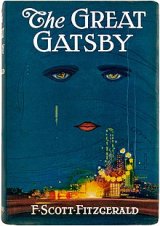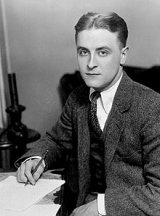The Great Gatsby Page #23
The Great Gatsby is a 1925 novel by American writer F. Scott Fitzgerald. Set in the Jazz Age on Long Island, near New York City, the novel depicts first-person narrator Nick Carraway's interactions with mysterious millionaire Jay Gatsby and Gatsby's obsession to reunite with his former lover, Daisy Buchanan. The novel was inspired by a youthful romance Fitzgerald had with socialite Ginevra King, and the riotous parties he attended on Long Island's North Shore in 1922
I’ve never bought a horse. I’ll have to follow you in my car. Excuse me for just a minute.” The rest of us walked out on the porch, where Sloane and the lady began an impassioned conversation aside. “My God, I believe the man’s coming,” said Tom. “Doesn’t he know she doesn’t want him?” “She says she does want him.” “She has a big dinner party and he won’t know a soul there.” He frowned. “I wonder where in the devil he met Daisy. By God, I may be old-fashioned in my ideas, but women run around too much these days to suit me. They meet all kinds of crazy fish.” Suddenly Mr. Sloane and the lady walked down the steps and mounted their horses. “Come on,” said Mr. Sloane to Tom, “we’re late. We’ve got to go.” And then to me: “Tell him we couldn’t wait, will you?” Tom and I shook hands, the rest of us exchanged a cool nod, and they trotted quickly down the drive, disappearing under the August foliage just as Gatsby, with hat and light overcoat in hand, came out the front door. Tom was evidently perturbed at Daisy’s running around alone, for on the following Saturday night he came with her to Gatsby’s party. Perhaps his presence gave the evening its peculiar quality of oppressiveness—it stands out in my memory from Gatsby’s other parties that summer. There were the same people, or at least the same sort of people, the same profusion of champagne, the same many-coloured, many-keyed commotion, but I felt an unpleasantness in the air, a pervading harshness that hadn’t been there before. Or perhaps I had merely grown used to it, grown to accept West Egg as a world complete in itself, with its own standards and its own great figures, second to nothing because it had no consciousness of being so, and now I was looking at it again, through Daisy’s eyes. It is invariably saddening to look through new eyes at things upon which you have expended your own powers of adjustment. They arrived at twilight, and, as we strolled out among the sparkling hundreds, Daisy’s voice was playing murmurous tricks in her throat. “These things excite me so,” she whispered. “If you want to kiss me any time during the evening, Nick, just let me know and I’ll be glad to arrange it for you. Just mention my name. Or present a green card. I’m giving out green—” “Look around,” suggested Gatsby. “I’m looking around. I’m having a marvellous—” “You must see the faces of many people you’ve heard about.” Tom’s arrogant eyes roamed the crowd. “We don’t go around very much,” he said; “in fact, I was just thinking I don’t know a soul here.” “Perhaps you know that lady.” Gatsby indicated a gorgeous, scarcely human orchid of a woman who sat in state under a white-plum tree. Tom and Daisy stared, with that peculiarly unreal feeling that accompanies the recognition of a hitherto ghostly celebrity of the movies. “She’s lovely,” said Daisy. “The man bending over her is her director.” He took them ceremoniously from group to group: “Mrs. Buchanan … and Mr. Buchanan—” After an instant’s hesitation he added: “the polo player.” “Oh no,” objected Tom quickly, “not me.” But evidently the sound of it pleased Gatsby for Tom remained “the polo player” for the rest of the evening. “I’ve never met so many celebrities,” Daisy exclaimed. “I liked that man—what was his name?—with the sort of blue nose.” Gatsby identified him, adding that he was a small producer. “Well, I liked him anyhow.” “I’d a little rather not be the polo player,” said Tom pleasantly, “I’d rather look at all these famous people in—in oblivion.” Daisy and Gatsby danced. I remember being surprised by his graceful, conservative foxtrot—I had never seen him dance before. Then they sauntered over to my house and sat on the steps for half an hour, while at her request I remained watchfully in the garden. “In case there’s a fire or a flood,” she explained, “or any act of God.” Tom appeared from his oblivion as we were sitting down to supper together. “Do you mind if I eat with some people over here?” he said. “A fellow’s getting off some funny stuff.” “Go ahead,” answered Daisy genially, “and if you want to take down any addresses here’s my little gold pencil.” … She looked around after a moment and told me the girl was “common but pretty,” and I knew that except for the half-hour she’d been alone with Gatsby she wasn’t having a good time. We were at a particularly tipsy table. That was my fault—Gatsby had been called to the phone, and I’d enjoyed these same people only two weeks before. But what had amused me then turned septic on the air now. “How do you feel, Miss Baedeker?” The girl addressed was trying, unsuccessfully, to slump against my shoulder. At this inquiry she sat up and opened her eyes. “Wha’?” A massive and lethargic woman, who had been urging Daisy to play golf with her at the local club tomorrow, spoke in Miss Baedeker’s defence: “Oh, she’s all right now. When she’s had five or six cocktails she always starts screaming like that. I tell her she ought to leave it alone.” “I do leave it alone,” affirmed the accused hollowly. “We heard you yelling, so I said to Doc Civet here: ‘There’s somebody that needs your help, Doc.’ ” “She’s much obliged, I’m sure,” said another friend, without gratitude, “but you got her dress all wet when you stuck her head in the pool.” “Anything I hate is to get my head stuck in a pool,” mumbled Miss Baedeker. “They almost drowned me once over in New Jersey.” “Then you ought to leave it alone,” countered Doctor Civet. “Speak for yourself!” cried Miss Baedeker violently. “Your hand shakes. I wouldn’t let you operate on me!” It was like that. Almost the last thing I remember was standing with Daisy and watching the moving-picture director and his Star. They were still under the white-plum tree and their faces were touching except for a pale, thin ray of moonlight between. It occurred to me that he had been very slowly bending toward her all evening to attain this proximity, and even while I watched I saw him stoop one ultimate degree and kiss at her cheek. “I like her,” said Daisy, “I think she’s lovely.” But the rest offended her—and inarguably because it wasn’t a gesture but an emotion. She was appalled by West Egg, this unprecedented “place” that Broadway had begotten upon a Long Island fishing village—appalled by its raw vigour that chafed under the old euphemisms and by the too obtrusive fate that herded its inhabitants along a shortcut from nothing to nothing. She saw something awful in the very simplicity she failed to understand. I sat on the front steps with them while they waited for their car. It was dark here in front; only the bright door sent ten square feet of light volleying out into the soft black morning. Sometimes a shadow moved against a dressing-room blind above, gave way to another shadow, an indefinite procession of shadows, who rouged and powdered in an invisible glass. “Who is this Gatsby anyhow?” demanded Tom suddenly. “Some big bootlegger?”
Translation
Translate and read this book in other languages:
Select another language:
- - Select -
- 简体中文 (Chinese - Simplified)
- 繁體中文 (Chinese - Traditional)
- Español (Spanish)
- Esperanto (Esperanto)
- 日本語 (Japanese)
- Português (Portuguese)
- Deutsch (German)
- العربية (Arabic)
- Français (French)
- Русский (Russian)
- ಕನ್ನಡ (Kannada)
- 한국어 (Korean)
- עברית (Hebrew)
- Gaeilge (Irish)
- Українська (Ukrainian)
- اردو (Urdu)
- Magyar (Hungarian)
- मानक हिन्दी (Hindi)
- Indonesia (Indonesian)
- Italiano (Italian)
- தமிழ் (Tamil)
- Türkçe (Turkish)
- తెలుగు (Telugu)
- ภาษาไทย (Thai)
- Tiếng Việt (Vietnamese)
- Čeština (Czech)
- Polski (Polish)
- Bahasa Indonesia (Indonesian)
- Românește (Romanian)
- Nederlands (Dutch)
- Ελληνικά (Greek)
- Latinum (Latin)
- Svenska (Swedish)
- Dansk (Danish)
- Suomi (Finnish)
- فارسی (Persian)
- ייִדיש (Yiddish)
- հայերեն (Armenian)
- Norsk (Norwegian)
- English (English)
Citation
Use the citation below to add this book to your bibliography:
Style:MLAChicagoAPA
"The Great Gatsby Books." Literature.com. STANDS4 LLC, 2025. Web. 25 Feb. 2025. <https://www.literature.com/book/the_great_gatsby_1598>.








Discuss this The Great Gatsby book with the community:
Report Comment
We're doing our best to make sure our content is useful, accurate and safe.
If by any chance you spot an inappropriate comment while navigating through our website please use this form to let us know, and we'll take care of it shortly.
Attachment
You need to be logged in to favorite.
Log In